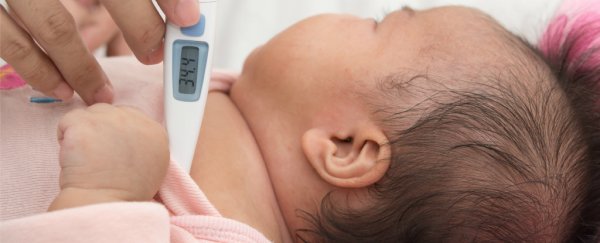A new study has shown that one in eight children in the US are now at risk of contracting measles - despite the fact that the disease was eliminated from the country 15 years ago.
The risk comes from a surge in children not getting the measles, mumps and rubella (MMR) vaccine - you know, that injection that definitively doesn't cause autism - or not receiving their boosters, leaving them open to infection from the incredibly contagious virus.
"We know some parents have concerns about vaccines and may want to avoid or delay vaccination, or follow an alternative schedule than the one recommended because they're concerned about the safety of the vaccine," said lead author of the study Robert Bednarczyk, from the Rollins School of Public Health in the US. "In fact, the vaccine is very safe, while not vaccinating is highly risky, leaving their children - and others - vulnerable to a serious illness that can cause a large number of complications."
At the moment, children who can't be given vaccines for medical reasons or because they're too young are protected against diseases such as measles by the fact that the majority of the population around them is vaccinated, so it's hard for outbreaks to get established - which is what's known as 'herd immunity'.
But the research also found that the US is getting very close to the herd immunity threshold of 94 percent, which is the percentage of people in a community that need to be immune to a disease to help prevent large outbreaks from occurring. If the US vaccination coverage drops to around 92 percent, the country risks losing that protection.
"While we currently have overall immunity in the population that should prevent sustained measles transmission, if the virus is introduced, there is the potential for large outbreaks," said Bednarczyk. "Currently, these children are protected because of the high vaccine coverage of the population, but that will change if we begin having more outbreaks and the percentage of children vaccinated declines."
Measles is one of the most contagious of the vaccine-preventable diseases, and it can lead to pneumonia, encephalitis, hospitalisation and even death in extreme cases - which is why it's so important that children are protected.
The current vaccination schedule requires all eligible children in the US to receive two doses of the MMR vaccine - first at 12 to 15 months, and then at four to six years old. But after studying the vaccination coverage rates of children below the age of 17, the researchers found that 12.5 percent of all children - almost 9 million - were not fully vaccinated, and therefore were at risk of the disease. The rate was even higher in infants, with 24.7 percent of children under the age of three at risk.
Perhaps most worrying is the fact that it would only take a 2 percent drop in vaccination rates to increase the rate of vulnerability from one in eight children to one in seven - meaning another 1.2 million children would be in danger.
"Although we eliminated continuous measles transmission in the United States about 15 years ago thanks to the effectiveness of the MMR vaccine and robust vaccination rates, these study results show that we can't get complacent," Bednarczyk explained.
The analysis of the US's vaccination coverage was presented at IDWeek 2015, the annual meeting of the Infectious Diseases Society of America.
